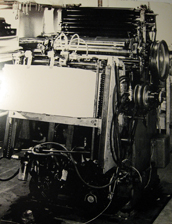Pages: 1 2
A.E.: I want to be provocative and say that why do we need any kind of warehouse at all and why not simply consign book production to the Print on Demand model and have outlets like Amazon do the selling/distributing.
J.P.: The concept of a warehouseless distribution system is certainly interesting and would definitely be of benefit to small publishers. Not only are warehousing expenses eliminated with a print-on-demand (POD) model but so are the production expenses. At least that is how it appears. Right now public-domain texts are the main market for this system. Because we are only at the beginning stages of this technology it is difficult to tell how it will impact modern, copyrighted texts. Saying that, I don’t think a traditional distribution system will entirely disappear. First of all, not everyone has access to the digital distribution channel, be it through an online reseller of physical books, a local bricks-and-mortar reseller with digital capabilities, or through a purely digital transaction such as e-book sales. Secondly, I suspect that traditional publishers may use the savings from a POD system (if there are any) to invest in the art of the book, creating products that simply cannot be produced by a POD system. This will help satisfy bibliophiles who purchase a book as much for its physical qualities as for the story it contains. I think the most exciting aspect of the digital marketplace is the ability to reach foreign markets. For many small to medium publishers, the expense of having multiple warehouses and distributors is too high. Canadian books could gain a larger global marketshare by selling directly into overseas markets. US sales could also improve with greater availability.
A.E.: The idea of a global Amazon could lead to monopoly, copyright problems, and or censorships when one or a few chains agree to strangle the life of a particular book.
J.P.: There is always the possibility of one company gaining control over an industry and abusing its position of control, especially when an industry is in transition. That is certainly the case with the digital side of publishing. Over the past few decades Canadian publishing has seen several book-retailers use their size and/or a near monopoly position to set terms that clearly favoured their own businesses. This is especially true when an industry like ours is going through a transitional phase into the digital realm. Fortunately, the industry as a whole is more robust than some people might think. Authors and publishers have stood up to these organizations several times and typically have come out the victors. As publishing moves out of this transitional phase and digital publishing matures I think you are going to see some very interesting innovations from both publishers and booksellers alike.
A.E.: What do you think is the future of the book in an increasingly digitised world? The analogue process from reflection copy to paper to film and plate and then to the printing machine and bound book has been so much short-circuited by computer production. Is there the possibility that we might also have no need for plates at some point? I know the Expressso Book Machine symbolises a futuristic move towards total digitisation.
J.P.: Digital technology has certainly had a profound impact on the publishing industry. In fact the ease and accessibility of desktop publishing solutions such as Indesign or Quark are one of the big reasons small press publishing in Canada has been able to flourish. In the future I think you’ll see better crafted hard copies of books that stand alongside POD and ebooks. The future may well include plateless production as is the case with most POD solutions but I also think that traditional plate and ink printing will continue to innovate offer compelling solutions to compete with POD. Of course ebook and POD technology will improve as well and that is why publishing is so exciting.
A.E.: What genres do you concentrate on in your production apart from poetry and why? Market forces, other considerations – aesthetic, national cultural considerations. For example Quatrro Press concentrates on the novella due to its historical contributions to global literature and because it is mostly ignored by most other Canadian publishers or small presses.
J.P.: Aside from poetry Turnstone publishes literary fiction, non-fiction (typically cultural memoir, but we are stepping into the world of art books and regional non-fiction) and mystery/thriller. Our mandate is to produce books that feature either Manitoba authorship or content in at least half of the books we produce. This vision was created by our founders and today it means that our primary consideration for publication is cultural. We feel we have an important role to play in bringing local stories to a wider audience and to that end we have been successful publishing first books by nationally renowned authors such as Miriam Toews, David Bergen, Sandra Birdsell, Lawrence Hill, Karen Connelly and many others. As a publisher I also feel it necessary to include short-fiction in our list because of the developmental role it plays for writers. For many first time authors short-fiction is their first step into publishing. Unfortunately, short fiction doesn’t receive the attention it should.
A.E.: How important do you think the role of the small press is to Canadian culture vis-vis its cousins, the American or the British?
J.P.: While I can’t speak in any detail about foreign small press publishing I feel the Canadian small press plays a vital role in Canadian Culture. Small presses are less concerned with profit margins and more with the people and places they exist. Small presses specialize in discovering new voices from diverse communities and have found a great deal of success in doing so. The fact that large publishing houses have over time, taken greater notice of new authors is due, I believe, in part to the influence of small presses.
A.E.: On that note I will say thank you very much for taking time off your busy schedule to talk to us and give our readers insights into Canadian publishing,
Pages: 1 2






No Comments so far ↓
There are no comments yet...Kick things off by filling out the form below.